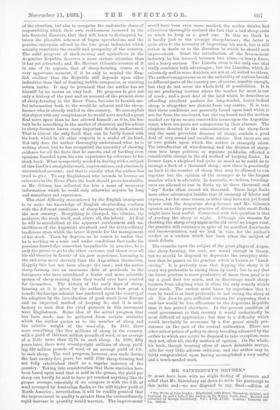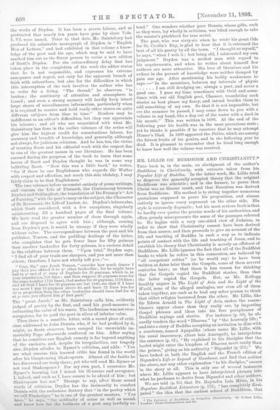MR. SAINTSBURY'S DRYDEN.* Er must have been with no slight
feeling of pleasure and relief that Mr. Saintsbury eat down to write his postscript to this noble and—we are disposed to say, final—edition of
" The Works of John Dryden. Illustrated, with Notes, Historical, Critical, and Explanat ry, and a Life of the Author, by Sir Walter Scott, Bart Revised and corrected by George Saintsbury, Vol.. XVII, XVIII London Paterson and Co. 1892.93.
the works of Dryden. It has been a severe labour, and so protracted that nearly ten years have gone by since Vols. L-VI. were issued. Prior to that date, Mr. Saintsbury had produced his admirable monograph of Dryden in "English Men of Letters," and had exhibited in that volume a know- ledge of the poet and his age, which may be said to have marked him out as the fittest person to revise a new edition of Scott's Dryden. For the extraordinary delay that has taken place in the completion of the work the editor states that he is not responsible, and expresses his extreme annoyance and regret, not only for the apparent breach of faith with subscribers, but also for the difficulties in which this interruption of the task involves the author who has to write for a living. "The thread," he observes, "is broken ; the continuity of attention and atmosphere is loosed ; and even a strong memory will hardly keep intact large stores of miscellaneous information, particularly when it is required to receive and hold ready other stores on quite different subjects from time to time." Readers may be indifferent to an editor's difficulties, but they can appreciate his labours; and all who are acquainted with what Mr. Saintebury has done in the earlier volumes of the series will
give him the highest credit for conscientious labour, for accuracy and breadth of knowledge, and generally, although not always, for judicious criticism. And he has, too, the virtue of treating Scott and his editorial work with the respect due to one of the greatest names in our literature. He has been amused during the progress of the book to learn that some lovers of Scott and Dryden thought he was in some way belittling Scott. "Now this was a little hard," he writes, "for if there be one Englishman who regards Sir Walter with respect and affection, not much this side idolatry, I may fairly claim to be that Englishman."
The two volumes before us consist entirely of prose writings, and contain the Life of Plutarch, the Controversy between Dryden and Stillingfieet, the translation of Du Fresnoy's " Art of Painting," with the poet's essay on the subject, the Character
of St. Evremont, the Life of Lucian, ike. Dryden's letters also, which Scott considered, with a few exceptions, singularly uninteresting, fill a hundred pages of the final volume. We have read the greater number of them through again, and are disposed to agree with him ; although, coming from Dryden's pen, it would be strange if they were wholly without value. The correspondence between the poet and his publisher, Tonson, and the peddling dealings of the latter, who complains that he gets fewer lines for fifty guineas than another bookseller for forty guineas, is a curious detail in the relations between them. 'Upon trial," Dryden says, "I find all of your trade are sharpers, and you not more than others ; therefore, I have not wholly left you :"— " Pray, Sir," says acob Tonson, "consider how much dearer I pay than you offered it to yo other bookseller; for he might have had to yo end of yo story of Daphnis for 20 guyneas, which is, in your translation, 759 lines ; and then suppose 20 guyneas more for the IMMO number (759 lines), that makes for 40 guyneas, 1518 lines ; and all that I have for 50 guyneas are but 1418, soe that if I have noe more I pay 10 guyneas above 40, and have 72 lines less for 50 in proportion than the ether bookseller should have had for 40 at ye rate you offered him ye first part."
The "great Jacob," as Mr. Saintsbury calls him, evidently judged of poetry by the foot, and used his yard-measure in estimating the value of his wares. The tradesman was not over- scrupulous, for he paid the poet in silver of inferior value. Then there is a sensible letter, with a sound piece of criti- cism addressed to John Dennis, who, if he had profited by it, might, as Scott observes, have escaped the unenviable im- mortality Pope afterwards conferred on him. After saying that he considers our English comedy is far beyond anything of the ancients, and, despite its irregularities, our tragedy also, Dryden alludes to Rymer's criticism, and adds : "You see what success this learned critic has found in the world after his blaspheming Shakespeare. Almost all the faults he has discovered are truly there; yet who will read Mr. Rymer or not read Shakespeare P For my own part, I reverence Mr. Rymer's learning, but I detest his ill-nature and arrogance. I, indeed, and such as I, have reason to be afraid of him ; but Shakespeare has not." Strange to say, after these sound words of criticism, Dryden has the insincerity to comfort Dennis with the audacious flattery that "in the poetry which
we call Pindarique " he is one of the greatest masters. "You have," he says, "the sublimity of sense as well as sound, and know how far the boldness of a poet may lawfully ex-
tend." One wonders whether poor Dennis, whose gifts, such as they were, lay wholly in criticism, was blind enough to take the master's pinchbeck for true metal.
The poet, who was sixty-six when he wrote his great Ode for St. Cecilia's Day, is glad to hear that it is esteemed the best of all his poetry by all the town. "I thought so myself," he says, "when I writ it ; but being old, I mistrusted my own judgment." Dryden was a modest man with regard to his acquirements, and when he writes about himself few authors are more attractive. His love of literature and his ardour in the pursuit of knowledge were neither damped by pain nor age. After mentioning his bodily weaknesses he says :—" In the meantime, between my intervals of physic,.
I am still drudging on; always a poet, and never a good one. I pass my time sometimes with Ovid and some- times with our old English poet, Chaucer, translating such stories as best please my fancy, and intend besides them to. add something of my own. So that it is not impossible, but ere the summer be passed, I may come down to you with a volume in my hand, like a dog out of the water with a duck in his mouth." This was written in 1698. At the end of the following year his health was in the most precarious state ; yet he thinks it possible if he recovers that he may attempt Homer's Iliad. In 1699 appeared the Fables, which are among the fairest fruits of his genius, and in the following year he died. It is pleasant to remember that he lived long enough to know how well the volume was received.







































 Previous page
Previous page